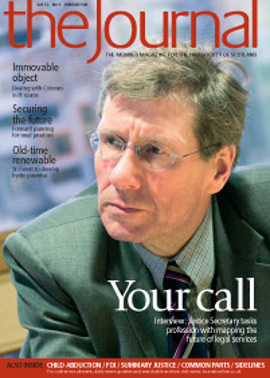Freedom has its boundaries

A recent landmark decision by Kevin Dunion, the Scottish Information Commissioner, could see public sector employers’ disciplinary and grievance procedures fall foul of the Freedom of Information (Scotland) Act 2002.
The Act covers 10,000 public bodies, ranging from the Scottish Parliament to GPs, and when it was introduced, it heralded a new era of a “right to know”.
The case involved an employee of the University of Paisley, Mr X, who raised a grievance with the university regarding the conduct of six named members of staff. The university took two years to investigate the content of the grievances, which is by no means a long timescale, given the complexity and sensitivity of such claims. At the end of the investigation, it did not uphold Mr X’s grievance. In informing him of that outcome, the university provided him with a summary of its investigations over the two year period. Mr X was not satisfied with the summary and raised an FOI request to obtain the primary documents, which largely consisted of the interview records. He also made several subject access requests under the Data Protection Act to the same end.
Provided in confidence
Relying on certain exemptions contained in the Act, the university withheld around 200 documents from Mr X on the grounds that it was unfair to release information about third parties. The university argued that much of the data requested by Mr X had been provided to it in confidence, and added that if forced to release the information, it would prejudice its ability to deal with future grievances.
At this point Mr X appealed to the Scottish Information Commissioner.
The Commissioner accepted that some of the data collected in relation to the grievance amounted to personal data under the Data Protection Act, and added that the university was entitled to withhold the information. His argument was based on the fact that a disclosure of information under the Freedom of Information Act amounted not only to a disclosure to the individual making the request but also to public disclosure. He pointed out that he could not allow an order for the information to be made available to the applicant alone.
The Commissioner explained that in making his decision, he had to consider whether the third party held a legitimate interest in the disclosure of the information and whether the disclosure was necessary to further his or her appeal.
Having examined the case in detail, he concluded that disclosure would have been unwarranted given that each of the parties had an expectation that the information they had provided would be kept confidential.
Limits of the exception
He added the exemption did not apply to information contained in documents which had been created for other purposes not covered by the grievance procedure, and that the university could not withhold the information solely on the grounds that its disclosure would prejudice the university in its disciplinary and grievance procedures – especially as the issue raised in the grievance in question fell outwith the list of functions covered by the Act.
Whilst agreeing that the university had been justified in withholding some of the information from Mr X, the judgment makes clear this may not always be the case. The verdict and the public “right to know” could have wide ranging and expensive implications for the way in which public sector employers conduct disciplinary and grievance procedures in the future.
Best practice in any investigation, whether prompted by grievance or a disciplinary charge, is to investigate sensitively, speedily and confidentially. It will be reassuring for practitioners to note that the Information Commissioner is prepared to respect these principles and to prevent individuals from compromising the integrity of such investigations by gaining access to sensitive personal material.
Stephen Miller is a Partner and Head of the Employment Law Group at MacRoberts, t: 0141 332 9988, e: stephen.miller@macroberts.com
In this issue
- More than just a new year
- Let youth have its say
- "You sort it out"
- A Colossus in the room
- ARTL cometh
- Letter from South Africa
- Lay justice reborn
- Power flows
- Year of the Commission
- Down to brass tacks
- Step up for Brussels office
- Small is doable
- Watching their diets
- 2008: let the fun commence
- Act going to plan
- Preferential treatment?
- Giving it the works
- Scottish Solicitors' Discipline Tribunal
- "Charity begins at home" - but does it?
- Website reviews
- Book reviews
- Freedom has its boundaries
- Pointing which way?
- There may be trouble ahead






